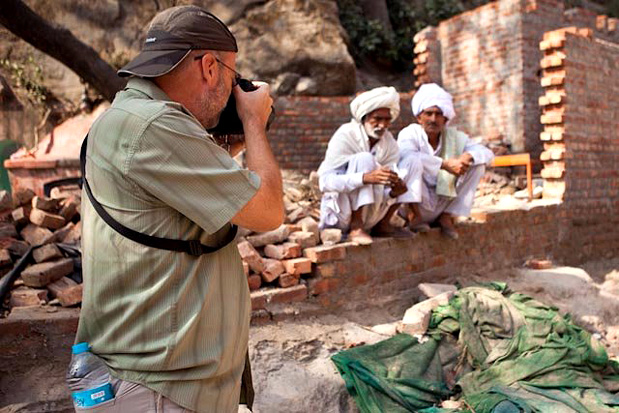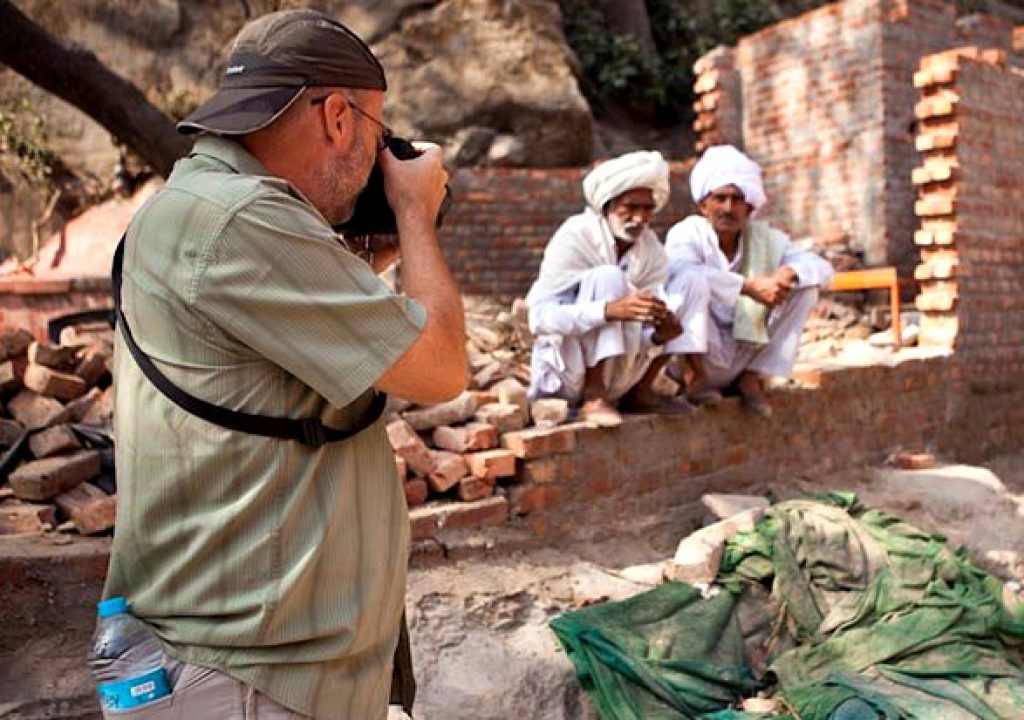
Photo by Lesley Fisher
Last Friday I did a blog post that drew a considerable response. The post titled “What is your Un-Suck Filter?” asked what things photographers do to savage an image, but ended in a deep conversation on the ethics of shooting images in cultures other than our own.
One reader made this comment with respect to cultural or travel photography: “How many people understand that their (or especially their children’s) photo will be used to promote a photographers professional reputation? Do they get asked if their image can be reproduced whether they agree with the context or not? Are Westerners the only people predominantly doing this?” I would like to expound on this and maybe try to bring some balance.
As we travel the world, we find things that are different and interesting and often visually exciting–things we are not used to seeing at home. So we snap a quick picture for our memories and move on. Not a problem…generally. But this gets complicated quickly. Where does our subject’s right to privacy start and where do we start becoming rude and obnoxious? There’s no easy answer however there are some common sense guidelines we can use.
Here’s a sample scenario. You are walking through a village in Thailand and you see an old man sitting smoking a classic pipe. He is wearing a traditional dress that is very colorful and the scene would make a great photo, what do you do? Here are some things to consider.
The best way to gather images in any village setting is to slow down and spend time in the village. Let the people there learn to trust you and spend time earning their trust. You can read my article “Dear Beginner, You make ripples!” for more information on this approach. But what if circumstances just don’t allow you to spend the time you want to in the village?
Here is a quick little matrix that might help.
Does the old man with the pipe see you? Have you made eye contact? If no, would you be able to take a photo of him without his knowledge? Ask yourself these questions:
- Would taking the photo make him or others watching feel you are a predator? If so, stop!
- Do you feel like a predator? If so, stop!
- Would you be willing to delete this image if asked? If not, stop!
- Once you make the image, is it good enough to walk up to the person and show them? If not, erase it!
- Would they look at it with approval? If not, erase it!?
Photo by Maria Michelangeli
Let’s say the man sees you and you make eye contact. What now?
- Show him your camera and motion that you want to take his picture. If he agrees, continue on. If not, stop!
- Shoot a couple images if he agrees, but be aware of the comfort zone. The comfort zone is both spatial and well as temporal. Every culture has spatial comfort zones. In India it can be very close while in America it is much further away. If you get too close, people feel anxious and uncomfortable. This is bad for them and for your photo. A comfort zone can also be defined by time. When taking a photo of anyone, you have only a few minutes to shoot the photo before they start to feel uncomfortable. Once you see that happening, stop!
- Always show your image to your subject. Even better, carry a small Pogo printer and give them a copy. It is a way to give back something after you’ve taken a photo.
If you take time with this man, you might tell him how you intend to use the images. Often, I shoot just for my portfolio. I think this is ok. Why? Because I am trying to build up a culturally sensitive bank of images that will allow my next NGO client to see I am the photographer who can help bring positive change to that village by my images. Does this always get communicated to the village or person I am taking pictures of? No. But I know my motives and I am fine with them. I had a Gujjar, a pastoral people in Kashmir, India, years ago tell me to take their photo and “exploit them”. I laughed because my meaning of “exploit them” was very different from their definition but I knew what they meant. They wanted the world to know about them and maybe bring them some help.
Some photographers will always be rude and stick a camera in someone’s face and “steal” an image. Some folks, like Bruce Gilden, make a living at it. The guy is a Magnum legend but I could not shoot that way. Others approach a subject like they are underlings and look at them as backwards or ignorant people. You can almost hear them saying: “Tisk, tisk, what a shame” as they shake their heads and snap the shutter. Photographer Ian Furness wrote in response: “there is so much misunderstanding in the world, so much negativity from misplaced patriotism and feelings of nationalist superiority to outright hatred.” I just call it what it is–ethnocentrism. Ethnocentrism is a belief that your own culture is the world’s baseline, that all other cultures are measured against yours. We all do it. We judge people and other cultures relative to our own culture and background. But the big question is to what extent? How much do we let this color our view of the world? It would be a pretty poor place to live if everyone was just like me. If you read my blog at thedigitaltrekker.com or stick around here at PPC long enough you will hear me rant on this.
I strongly believe that photographers who travel and are open to understand and learn about other cultures will have significantly better images that those that let their ethnocentrism rule their opinions and paint their view of the cultures they visit. No, ethnocentrism does not influence color balance or composition (actually it might). It doesn’t have anything to do with f-stops or shutter speeds but it has everything to do with the story you are communicating in your pictures. It has everything to do with capturing truth in your image. With a strong bias towards our own culture, we find it easy to make a picture of a man sleeping and instead of the image communicating a hardworking man resting, we see a lazy man lounging and wasting time. Our ethnocentrism informs our photographic vision and left unchecked, will soon create a biased theme in our photographs like the musical id©e fixe-a recurring theme or an even stronger, recurring obsession that keeps saying “tisk, tisk, tisk.” The fact is this works both ways. We can become fixated on the widow or the orphan when wanting to tell their story. But even if our motives are pure, we miss the culture as a whole and still end up painting a false picture. Miss the context and soon viewers will wonder if the village is only made up of widows and orphans. That happens when we look at life in extremes but that is for another post.
I hesitate to say this but I do not want to keep the ethnocentric photographer from his camera. As bad as they are and as misinformed as they are, they should have the freedom in public forums to shoot what they want. Note I said in public forums. This freedom does not license them to walk into someone’s hut in Africa and start taking photos anymore than they have the freedom to walk into my home and do the same. But I strongly believe we need to have the right to be able to shoot a photo of anything or anyone in public. It is like freedom of speech. I may not like what you say but I have to defend your right to say it. In the same way, I may not like the way you go about gathering photographs of me or my family in a public forum but I have to defend your right to take them. If not, we will soon find ourselves like many photographers in England where they get arrested for practically just raising a camera to their eyes in public!
In closing, the question raised was: is this only a Western phenomenon? Is it only Westerners who travel in Asian countries that do this? Of course not. If you go to any Asian based photo forums you will see pictures of smiling kids from Asian villages that are both well thought out and respectful as well as rude and offensive. Often in India when my daughter Jessie was a baby or a little girl, Indians would sneak a photo of her. Sometimes they would come up and ask to take a photo of her or with her. Even today when I lead workshops in places like India or Indonesia, locals approach us and want photos of the strange foreigners. We are different than the norm and are exotic to them. The fact is turn about is fair play.

